Reagan Rose's Blog
November 13, 2025
The Hard Way Is the Easy Way
âThe way of a sluggard is like a hedge of thorns, but the path of the upright is a level highway.â â Proverbs 15:19
Some years ago, our family went canyoneering just outside of Zion National Park. It was a beautiful experience, but it ultimately turned into a bigger adventure than we had bargained for.
The guide we hired offered an option to have a shuttle pick us up at the end of the expedition. Being a relatively fit (and cheap) group, we elected to save some money by hiking our way back instead. This was a mistake.
Tired from several hours of rappelling and hiking through slot canyons, we emerged into the bare desert landscape. There stood our guide, squinting in the sun and uttering the less-than encouraging words, “Um, I think it’s this way.”
Blindly following the blind, we bushwhacked our way through thorny shrubs. The desert sun beat on our backs as the loose gravel tripped our feet. It was a rough journey and involved a lot of backtracking.
About an hour into our death march, our guide sheepishly admitted we were the first ones to ever opt out of paying for the shuttle service. There was no trail, and this was his first time hiking out, as well. But he was confident we would find our way back before nightfall.
Tears were shed. Fingers were pointed. But after another hour, red from exhaustion and dust, we finally found our way back to our vehicles.
I was thinking about that story as I read Proverb 15:19 this morning. Solomon compares the way of the sluggard to a hedge of thorns. In his sloth, he wants to take the shortcut, the âeasier way,â but what he finds instead is more pain and difficulty. In our case, it was the shortcut of trying to avoid the immediate pain of spending a little extra money for the shuttle. The result was that we ended up paying much more in pain, discomfort, and time.
It’s a lesson we have to drill into our heads: Every time we choose temporary comfort over doing the hard thing, we aren’t avoiding the pain; we’re just putting it off. Eventually, procrastination has to be paid back with interest. Laziness promises peace now, but compounds pain in the future. It makes the fool’s bargain of trading temporary discomfort for long-term regret.
In the moment, Iâd rather stay in bed than get up and read my Bible. Itâs more comfortable to sit on the couch than go to the gym. It tastes better to eat junk food than vegetables. But in the long run, laziness is never worth it.
Solomon says, “but the path of the upright is a level highway.â In the long run, the hard path will prove to be the smoother one. The path of God-honoring faithfulness in our responsibilities isn’t always easy and it’s rarely comfortable, but from the perspective of eternity, it will prove to have been the better way.
November 6, 2025
Work Hard. Rest Hard. Trust God.
When my wife and I first got married, I was working three jobs.
During the day, I did campus ministry, in the evening I built websites for freelance clients, and at night I cleaned office buildings.
It was exhausting and rest was hard to come by.
In those days of hustling just to scrape by, I viewed rest as a necessary evil.
“If I just didnât have to sleep,” I thought, “then I could work a few extra hours each day and be able to catch up on the bills!”
It eventually caught up with me.
I distinctly remember flopping down in a chair in the lobby of an empty bank I was cleaning one night. I just put my face in my hands and cried. I wasn’t sad, I was just so tired, and there was no hope of it letting up anytime soon.
The Lord used that experience to lead me to the biblical truth that not only do we need rest, but it’s actually a gift from God.
Rest is a gift because it reminds us of our limits, and our limitless God. The psalmist brings us face to face with this in Psalm 127:1
Unless the Lord builds the house, those who build it labor in vain. Unless the Lord watches over the city, the watchman stays awake in vain.
No matter how hard we push ourselves, we all have a limit. But God does not.
Often we push ourselves to not rest because of external pressuresâa deadline, financial fears, or people pleasingâbut even as these pressures are real, we must remember that ultimately it will the Lord who provides for us. And perpetually running yourself ragged may be more of an expression of unbelief than it is of bravery.
He goes on in verse 2 to say,
It is in vain that you rise up early and go late to rest, eating the bread of anxious toil; for he gives to his beloved sleep.
If you’re feeling exhausted or guilty about resting today, remember that the type of productivity which pleases God isn’t the hustle-til-you-drop kind, it’s the type that admits, âHe is God, I am not.â
Work hard. Rest hard. Trust God.
Learn to view rest not as a necessary evil, but as a blessed gift from a loving Father.
October 28, 2025
The Bible’s Secret to Lasting Habit Change
Download printable habit tracking worksheet
“Even a child makes himself known by his acts, by whether his conduct is pure and upright.” â Proverbs 20:11
Have you ever noticed that we frequently describe people’s character by their habits?
A liar is someone who lies habitually. A kind person is not someone who is kind, not just once in a while, but repeatedly and consistently. A lazy person isn’t just someone who sleeps in once in a while, but one whose pattern of life is marked by consistent idleness.The truth is your habits aren’t merely behaviors you repeat, as if they were somehow external to you. Your habits reveal who you are on the inside. As our Lord said, “a tree is known by its fruit” (Matthew 12:33).
Habits are character.
So if we really want to change our habits, we must understand that we are not just modifying behavior, but undertaking nothing less than the altering of our very character. When we seek to change a habit, we aren’t just trying to do things differently, but to become someone different.
No wonder changing our habits is so hard!
An Unbreakable ConnectionTo break bad habits, we need to first appreciate the unbreakable connection between behavior and belief. The work of habit change, whether removing an old habit or adding a new one, is the process of adapting our behavior to correct beliefs.
This means habit change involves two parts:
Correcting beliefsCorrecting behaviorIn my experience, however, believers tend to neglect one of these two essential elements.

Some focus on correcting beliefs, trusting that behavior change will naturally follow. This is a good instinct, but the omission of the “how” of habit change often leaves people in a state of frustration, knowing they should be acting differently but unsure of how to connect their beliefs to their behavior in practice.
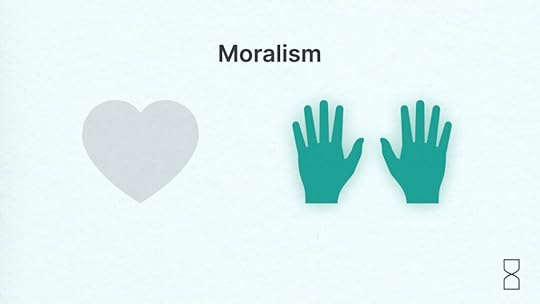
Others emphasize behavior change, but neglect the need for belief change. They might hand you a copy of Atomic Habits and say, “Just follow the four laws of behavior change.” But the worst-case scenario is when this actually works! The behavior changes, but the person remains unchanged. The wrong beliefs just get buried under a more acceptable set of externals. Worse yet, you get the glory for the discipline that led to your behavior change instead of God alone who doesn’t merely modify behavior but transforms us from the inside out.
For truly God-honoring habit change, we must correct both belief and behavior.
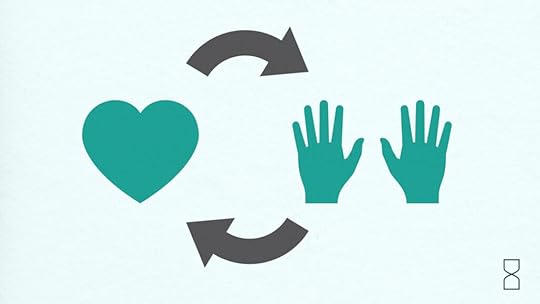 Correcting Your Beliefs
Correcting Your BeliefsAll habits are the result of beliefs.
Bad habits are the result of believing lies. Good habits are the result of living in accordance with the truth.
To help us understand this, let’s look at Romans 12:2:
And do not be conformed to this world, but be transformed by the renewing of your mind, so that you may approve what the will of God is, that which is good and pleasing and perfect.
The apostle’s point is that a transformed mind (beliefs aligned with God’s truth) should result in a pattern of living which pleases God (e.g. bad habits forsaken, good habits embraced).
Practically, then, when we observe a bad habit in ourselves, something which we know is displeasing to God, we should begin by prayerfully tracing that behavior to its ideological source. This work can be aided by the counsel of a mature believer, pastor, or biblical counselor.

The lies behind the bad habits are likely deep and multi-dimensional, but be sure of this: behind every bad habit there is a lie being believed. When we discover erroneous beliefs, we must then replace them with the truth of God’s Word (see Ephesians 4:22â24 and Colossians 3:9-10). This is the first step toward God-honoring behavior change.
Some examples of bad habits that may be the fruit of false beliefs.
Bad HabitFalse BeliefBiblical CorrectionResultant Habit Change1. ProcrastinationâMy worth is based on my performance, so if I canât do it perfectly, itâs not worth starting.âScripture teaches that my worth is in Godâs love for me and in Christâs finished work (Ephesians 2:8â10). My work is an act of service, not self-validation.The believer begins tackling tasks promptly, motivated by stewardship rather than fear of failure.2. Overeating or other types of overindulgenceâComfort comes from food (or entertainment, or shopping, etc.).âGod is âthe God of all comfortâ (2 Corinthians 1:3â4).Instead of running to food or media for relief, the believer turns to prayer, meditation on Godâs gifts, and gratitude.3. Neglect of prayer or ScriptureâI can handle life on my ownâ (though perhaps manifesting in excuses like âI donât have timeâ).Jesus said, âApart from Me you can do nothingâ (John 15:5).Seeing dependence as the source of their strength, the believer begins building daily communion with God as essential, not optional.But don’t stop here.
That final step of resultant habit change is not automatic. The process of habit change begins in the mind and heart, but it must work its way out in the hands. And this will require discipline.
Correcting Your BehaviorHere’s where even mature believers give up too early in the process. They become convicted of a lie they are believing that is leading to an ungodly or unwanted behavior pattern. They then (rightly) take the truth of Scripture and use it to flush the lie out and replace it with truth. But then they go no further. And they soon discover that even though they have corrected the belief, the behavior seems to continue unchanged.
This is incredibly demoralizing. And if left unaddressed, it can undermine one’s belief in the efficacy of God’s Word to transform us. But what has actually happened is that the Christian has simply neglected the second element of biblical habit change. They have corrected their beliefs, but they have not pressed on to deliberately correct their behavior according to those beliefs.
When the Apostle tells the believers in Rome to “consider yourselves dead to sin, but alive to God in Jesus Christ” (Romans 6:11), he is telling them to behave as if they really believe that spiritual truth. When I reckon myself dead to sin, I do not continue walking in the same habits of letting “sin reign in [my] mortal body so that [I] obey it’s lusts” (6:12). Instead of lending my body to be used by Satan for His purposes, I let my members become “instruments of righteousness.” The reckoning is the belief, and the offering of my members to God is the behavior. Both steps are necessary.
The practice of effectuating habit change in our behavior is hard work. It involves the difficult, often long-term, effort of not only reminding ourselves of the truth, but also of conforming our behavior to fit our newly corrected beliefs. This requires discipline (see 1 Corinthians 9:27).
Here is where structured practices can be incredibly helpful:
Memorize relevant Scripture. Choose passages that contain the antidote truth the lies behind your bad habits, or which commend the good habits you are seeking to establish.Track your habits. Set specific habit goals, and keep track of your progress over time. This is just a tool. You will not need to do this forever. But the marking of progress will help you see where you need help and give you a testimony of God’s faithfulness in helping you to change. Every check mark becomes a stone of remembrance to God’s grace.Seek accountability. Find other believers who are serious about growth, and help one another stay the course. This a highly practical way to bear one another’s burdens (Galatians 6:2) and encourage and build each other up (1 Thessalonians 5:11).ConclusionBiblical habit change is not merely modifying our behavior, nor is it just assenting to what the Bible says. To be truly transformed, we must submit our wrong beliefs to the truth of God’s Word and apply ourselves in His power to live as though we really believe those things to be true.
More Resources on HabitsDownload habit tracking worksheetMy interview with Dr. Greg Gifford, biblical counseling professor and author of Heart & Habits.You Are What You Repeat: How Identity Fuels HabitsMy interview with Darryl Dash, author of 8 Habits for GrowthWhy Youâre Inconsistent (And What to Do About It)October 14, 2025
9 âProductiveâ Things I Refuse to Do
The world says that productivity is about speed, hacks, and just cramming more things into each day. But from God’s perspective, that’s a lie. Real productivity is about wisdom. It’s about stewardship. It’s about doing the things that matter most with an attitude that most honors God.
As I have sought to filter my concept of personal productivity through a biblical lens, here are nine so-called âproductiveâ things Iâve stopped doing.
1. I Donât Own a Smart PhoneThis month marks one year since I stopped using a smartphone. And it was one of the best decisions I’ve ever made.
The irony is that these amazing gadgets promise to make us more productive, but I found that for me, it was mostly just a distraction machine. Sure, I could answer emails anywhere, but thatâs rarely the most effective thing I should be doing.
Now, I use an Apple Watch with its own cellular plan. I can call, text, and do basic things with it, but I canât scroll mindlessly. And as a result, Iâm less distracted and more focused. I read more books, spend more time in the Word and in prayer, I think more deeply, and I’m more present in the relationships I value.
I’d call that a net positive.
2. I Donât Hustle All the TimeGod calls us to faithfulness, not frenzy. Constant busyness isnât sustainable, and it’s not actually all that productive in the long run.
Yes, there are seasons when I work fast and long hours, but I have learned to avoid letting that become the norm. When I slow down and move deliberately, I produce better work and live with more peace.
Slow and steady faithfulness is what I’m aiming at.
3. I Donât Work on WeekendsIâm not a strict Sabbatarian, but I take Jesus seriously when He said,
âThe Sabbath was made for man.â (Mark 2:27)
Rest is a gift. When I stop working for the week, Iâm acknowledging that itâs Godânot meâwho keeps the world running.
This is never easy. I work for myself, so there’s always more work I could be doing. But the Lord has shown me (often through some hard seasons of burnout) that I am only human.
Not working on the weekend shouldn’t be a revolutionary thing, but in today’s hyperactive work culture, it feels like some kind of luxuriant indulgence.
But time and again I’ve found that when I shut my laptop on Friday afternoon and put it in a drawer until Monday morning, the world keeps spinning without me.
I’ve come to see that refusing to work all the time is an act of faith.
4. I Donât Fill My Calendar to the BrimI believe in structure. I even teach people to create an ideal weekly scheduleâa plan for their work, rest, and responsibilities. But I also believe in margin.
Leaving space allows me to focus on higher-leverage activities instead of reacting to whatever feels urgent.
Busy â Productive.
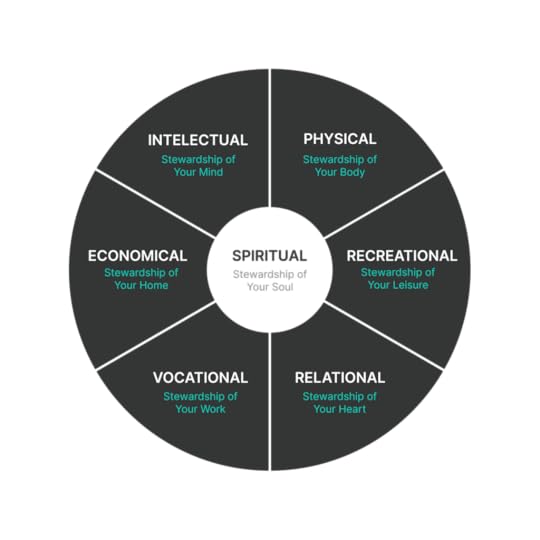 The Domains of Stewardship
The Domains of StewardshipFurthermore, productivity isnât just about work; itâs about every domain of stewardship God has given you. You canât steward those well if your calendar is packed to the edge, or at least I can’t.
5. I Donât Get Everything DoneAnd that’s because… that’s impossible. But we like to tell ourselves that if we just grind hard enough, we will eventually reach that mythical day in which every task is finally checked off the list and we can rest.
But the truth is that âdoneâ isnât when you cross the last item off your list, itâs when God calls you home. Done is when you die. Until then, there will always be more work to do.
So what do we aim at? Faithfulness (noticing a theme here?).
Unless the Lord builds the house, those who build it labor in vain. Unless the Lord watches over the city, the watchman stays awake in vain. â Psalm 127:1
Every day is a new opportunity to serve the Lord. I do what I can with the day, then I rest. And tomorrow we do it again. But this attitude is only workable when we recognize that it’s God who is ultimately accomplishing the work; we just enjoy the privilege of being used by Him.
6. I Donât Do Side ProjectsThis one was hard for me to learn. But dividing your attention doesnât make you twice as productive. It makes you half as effective.
I talked about this more in The Power and Pitfalls of Side Gigs, but the headline is that every additional âside thingâ comes with hidden costs: mental overhead, context switching, and stress.
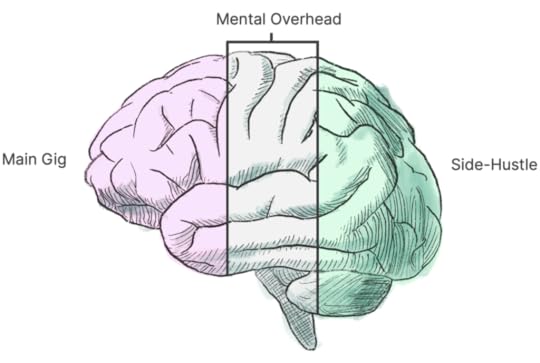
Focus is a superpower. Iâve learned to keep my attention on the one thing Godâs called me to do right now. And this, in turn, creates leverage to do that one thing with excellence (Lord willing).
7. I Donât Sacrifice My Family on the Altar of ProductivityâLet your eyes look directly forward, and your gaze be straight before you.â â Proverbs 4:25
If you think productivity is only about your job, youâll neglect everything else God has entrusted to you.
Your work is just one domain of stewardship. True productivity means being faithful in all of them.
âIf someone does not know how to manage his own household, how will he care for Godâs church?â â 1 Timothy 3:5
Your family is not a distraction from your productivity. Theyâre part of it. And that often means I have to make an effort of the will to not just limit my working hours, but also to be fully present with them mentally.
8. I Donât MultitaskMultitasking is a myth. What we really do is rapid task-switching. And it makes us slower and less focused.
It feels productive when we jump between email, messages, and spreadsheets because you are busy and your mind is fully engaged. But it’s actually less efficient than working on one thing at a time.
A few ways I’ve employed a “no multi-tasking” rule in my work:
Only open email during scheduled times.Close unused windows or browser tabs.Define the task before I start.Utilize an egg timer to force myself to stick to one thing until the clock runs out.Keep a pen and paper nearby to jot down ideas or other work that needs to be done instead of letting them interrupt what I’m doing.God gave us one mind. We glorify Him best when we bring it fully to one thing at a time.
9. I Donât Neglect SleepProductivity culture often glorifies the person who gets up at 3 a.m. and works late into the night.
But Psalm 127:2 says:
âIt is in vain that you rise up early and go late to rest,
eating the bread of anxious toil,
for He gives to His beloved sleep.â
Sleep is an act of faith. You canât get anything done while youâre sleeping, and thatâs just the reminder we need.
I’m an early riser, but that’s only because I go to bed early. Sacrificing sleep for the sake of “productivity” is not a sustainable strategy.
The thing to remember is that when you close your eyes at night, youâre declaring, âGodâs got this.â
He never sleeps. So you can.
The Bottom LineThe world measures productivity by output and speed. God measures it by stewardship and faithfulness.
I donât do these nine âproductiveâ things because I believe God is sovereign. My role is to be faithful with the little Heâs given me each day, to seek first His kingdom, and to rest in His care.
October 9, 2025
The John MacArthur Bible Reading Plan
Most Bible reading plans aim to get you through Scripture in a year. Others focus on deep study of just a few verses at a time. But John MacArthurâs Bible reading plan sits in a fascinating middle ground. Itâs simple, itâs repeatable, and it will give you a deep familiarity with the New Testament like few other methods can.
This is the plan I used in the years leading up to seminary, and I continue to benefit from it to this day. I can quickly recall where passages are, what each chapter is about, and how the New Testament fits together because of the investment I made in this reading plan over a decade ago.
If you own a MacArthur Study Bible, youâll actually find the plan outlined in the front pages. But let me break it down for you here.
How the Plan WorksThe goal is straightforward: read the New Testament 30 times over the course of about 3 years.
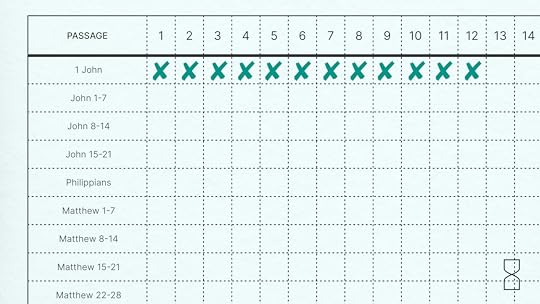
That might sound extreme, because it is! The purpose of this plan isnât to rush through Scripture; itâs to build deep familiarity and let Godâs Word sink into your heart. Remember Davidâs words in Psalm 119:11:
âI have stored up your word in my heart, that I might not sin against you.â
Thatâs what this plan is all about: storing up Godâs Word so it becomes part of you.
Hereâs the process:Choose a short book (MacArthur suggests starting with 1 John).Read it in one sitting each day for 30 days.The repetition may feel tedious at times, but somewhere around day 15 or 16, youâll notice things âopen upâ in the text.Summarize each chapter.As you read, jot down a one- or two-word summary of each chapter.Over time, youâll build a mental index of the book. Youâll know, â1 John 1 is about X, 1 John 2 is about Yâ¦, etc.“Move through longer books by sections.Not every book is as short as 1 John. For longer books, divide them into natural sections you can read in a single sitting.Why This WorksMost Bible reading plans are designed for exposure. A âBible in a yearâ plan gives you the wide-angle view of Scripture, which is incredibly valuable. Memorization drills down to the other extreme, focusing intensely on just a few verses.
MacArthur’s plan lives somewhere in the middle.
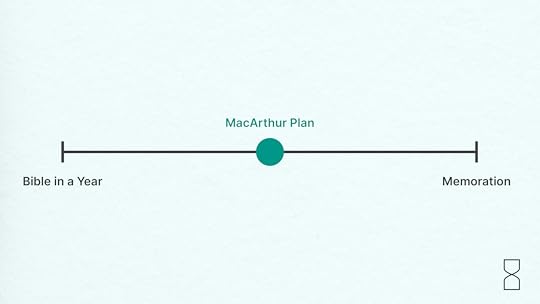
By saturating yourself in the same book or section over and over, you push Godâs Word deep into your mind and heart.
Years after finishing this plan, I can still feel its impact. I know where passages live, I can connect chapters to their themes, and I approach the New Testament with a kind of familiarity that has shaped my ministry and my daily walk with Christ.
Download the WorksheetTo make this easier, Iâve created a worksheet that divides each book of the New Testament into daily sections. You can print this off and use it to mark your progress.
If you commit to reading each section for 30 days, youâll make your way through the whole New Testament about 30 times in three years.
MacArthur Simple Bible Reading PlanDownloadOctober 2, 2025
Reagan’s Roundup: October 2nd, 2025
Your weekly roundup of insights and resources to help you get more done for the glory of God.
In Todayâs Issue:The Nearsightedness of WorryReducing Problematic Screen TimeAI-Generated “Workslop” Is Destroying ProductivityNo Service to Jesus Is Too SmallTozer on Killing TimeDear steward,
This morning, I was studying Matthew 6:24â34 (this is the one about not worrying about tomorrow).
I’ve read this passage a million times, but today I was struck by Jesusâ rhetorical question at the end of verse 25, âIs not life more than food, and the body more than clothing?â
Heâs saying that worry is a symptom of nearsightedness.
When we get anxious about the necessities of life, we are myopically focusing on simply keeping our head above waterâhow to pay the bills or just get through the week. We become so concerned with survival that we forget our lives are a stewardship. Weâre so focused on counting pennies on the floor, we fail to look and remember we are sitting in the palace of the King of Kings.
This is why worrying about our needs (as real as they may be) is actually profoundly unproductive. “And which of you by being anxious can add a single hour to his span of life?” (Matthew 6:27). Not only does the worry not actually do anything, worse, it’s a distraction from where we should be fixing our eyes.
When you’re feeling anxious about the necessities of life, the solution is to readjust your focus, zoom way out. Remember the God of the universe has called you to a purpose, and if you fix your eyes on seeking His kingdom and righteousness, you can trust that loving Father to take care of the details, even as he does for the sparrows and lilies.
Whatâs New7 Strategies to Reduce Problematic Screentime (14 mins)“But seek first the kingdom of God and his righteousness, and all these things will be added to you.”
â Matthew 6:33

Do you ever feel like your phone is controlling you more than youâre controlling it? In this week’s video, I want to help you identify problematic screen timeâand provide you with some strategies to reduce it without guilt, legalism, or trying to completely eliminate technology from your life.
Worth Your TimeAI-Generated âWorkslopâ Is Destroying Productivity (8 mins)âAs AI tools become more accessible, workers are increasingly able to quickly produce polished output: well-formatted slides, long, structured reports, seemingly articulate summaries of academic papers by non-experts, and usable code. But while some employees are using this ability to polish good work, others use it to create content that is actually unhelpful, incomplete, or missing crucial context about the project at hand. The insidious effect of workslop is that it shifts the burden of the work downstream, requiring the receiver to interpret, correct, or redo the work. In other words, it transfers the effort from creator to receiver.âNo Service for Jesus Is Small (5 mins)
This is a good reminder. âJesus calls his followers to lives of humble, ordinary, deeply significant service, from his goodness and for his glory. The mundane matters.âModesty in the Modern Age (13 mins)
An excellent piece on the heart behind genuine biblical modesty by Jennifer Kass.Words of Wisdom
Take your Christian productivity to the next levelâWhen you kill time, remember that it has no resurrection.â â A.W. Tozer
Listen to the Podcast â The Redeeming Productivity Show is available on all podcast platforms and YouTube.â
Get the Book â Grab a copy of âRedeeming Productivity: Getting More Done for the Glory of Godâ
Join the Academy â Get access to all of our courses, workshops, private community, planner, and moreââ
Use the Planner â The all-in-one productivity system designed for Christians
September 25, 2025
Reagan’s Roundup: September 25th, 2025
Your weekly roundup of insights and resources to help you get more done for the glory of God.
In Todayâs Issue:Christian Productivity & The WordFree Goal PlannerHighlight Your Bible Part 2ToDoist’s Game-Changing New FeatureBecoming the Person Who Does the ThingDear steward,
I was texting with a friend last week who acknowledged his need for time in the Word each day, but felt that morning devotions competed with his exercise routine. He was understandably loath to give up a habit that was helping him stay healthy and more productive throughout the rest of his day.
Hereâs what I said:
If you get the spiritual right, everything else gets right. The only power you have to do whatever you need to do in a way that pleases God comes from your connection to the True Vine. . . . Every excuse we have for skipping time with the Lord is dumb dumb dumb if we really believe that.
Now, I wasn’t suggesting he should give up his exercise, but encouraging him to get creative in making time for both. Stewardship of our physical bodies is important. Paul acknowledges as much. But he points out that there is something even more valuable.
âfor while bodily training is of some value, godliness is of value in every way, as it holds promise for the present life and also for the life to come.â â 1 Timothy 4:8
Now, look, we all know that our walk with the Lord needs to be prioritized. Itâs easy to say amen to that. But busyness tests the sincerity of that belief.
We know we should start the day with the Word, but when the pressure is on, it feels more productive to get a jump start on email. When we’re stressed, we know that stopping to pray is the right thing. But in practice, we tend to just keep plowing through the to-do list.
But truly Christian productivity is impossible apart from a connection to Jesus Christ.
If we arenât walking with Him, it is impossible to bear fruit that pleases Himâin any area of life.
We’ve got to make time for it.
Get a Free Goal PlannerI spent the greater part of yesterday doing my personal quarterly review and planning process. Here’s what I did:
Rewrote my Well Done StatementRevisited my 5-Year AspirationsSet my goals for the next 3 monthsCrafted a new weekly scheduleAnd I did it all in the Waypoints Goal Planner.
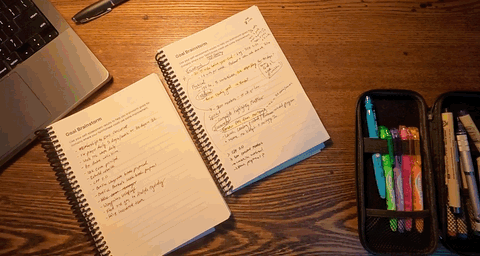
This is the planner I designed myself based on the principles I teach in Redeeming Productivity. And for a limited time, you can get a print copy of it for free, shipped directly to your door.
Join Redeeming Productivity Academy this week and get a free spiral-bound edition of the Waypoints Goal Planner ($30 value).
In the Academy, youâll also get access to our 9-week Waypoints to Well Done curriculum, the private RPA community, access to monthly workshops and productivity resources, the book club, and much more.
If youâve been on the fence about trying out the Academy, nowâs a great time to check us out and get a nice little free bonus.
*Offer valid for annual or monthly plans. Offer ends 11:59pm ET, September 26th, 2025.
Whatâs NewHow to Highlight Your Bible: Part 2 (32 mins)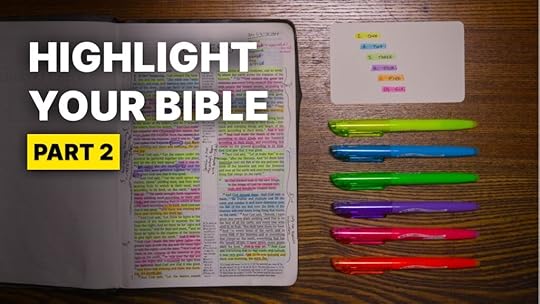
In this follow-up to my first “How to Highlight Your Bible” video, I walk you through more examples of using hierarchical highlighting for different genres of Scripture: Old Testament Narrative, Biblical Poetry, New Testament Narrative, and Epistle.
Weekly WordFor the word of God is living and active, sharper than any two-edged sword, piercing to the division of soul and of spirit, of joints and of marrow, and discerning the thoughts and intentions of the heart.
â Hebrews 4:12
The Bible is unlike any other book. Every time you open the Scriptures, you invite the Lord to search, shape, and strengthen you. Do not neglect the reading of the Word.
Worth Your TimeHow Much Time Should We Spend Reading the Bible? (4 mins)I appreciated Tim Challiesâ response to a deceptively hard question, âI understand that reading the Bible involves opening a book and reading its words, yet devotional Bible-reading is not like reading Tom Clancy or John Piper or anyone else.âToDoist Adds New Task Dictation Feature, Ramble (4 mins)
The popular to-do list app ToDoist added a really cool new beta feature: âRamble is a voice-to-tasks feature in Todoist that lets you quickly add tasks using your voice. Just speak naturallyâRamble listens, transcribes, and captures actionable tasks in real-time. This makes adding tasks on the fly fast and effortless, whether your thoughts are organized or not.âBecoming the person who does the thing (4 mins)
âYour beliefsâand therefore approach to what a healthy life looks likeâare foundational. It might sound obvious, but what you believe a âlife well livedâ looks like has a pretty transformative impact on both what life you end up building and how well lived it looks.âWords of Wisdom
Take your Christian productivity to the next levelââRomanticizing the past’ is a familiar accusation, made mostly by people who think it is more grown-up to romanticize the future.â
â Paul Kingsnorth
Listen to the Podcast â The Redeeming Productivity Show is available on all podcast platforms and YouTube.â
Get the Book â Grab a copy of âRedeeming Productivity: Getting More Done for the Glory of Godâ
Join the Academy â Get access to all of our courses, workshops, private community, planner, and moreââ
Use the Planner â The all-in-one productivity system designed for Christians
September 18, 2025
Reagan’s Roundup: September 18th, 2025
Your weekly roundup of insights and resources to help you get more done for the glory of God.
In Todayâs Issue:Time Management for Christian WritersDeath to InboxesWork Is More Than a PaycheckReading as RebellionE3 Pastor’s ConferenceDear steward,
I pray your week is going well.
Tomorrow is our Post-Summer Productivity Workshop!
We have over 450 people registered already. But that means there are only about 50 spots left as of this writing. So, if you’d like to attend or have access to the recording afterward, please register now.
P.S. There will be a special offer just for those who are live on the call.
Whatâs NewTime Management for Christian Writers (15 mins)
A three-part method for fitting the writing life into real life. If you’re a writer or aspiring writer, this one is for you.
Weekly Word“In the same way, let your light shine before others, so that they may see your good works and give glory to your Father who is in heaven.”
â Matthew 5:16
True productivity is not about getting noticed, but about making Christ known. When you perform your tasks and make your decisions today, do them with the aim of pointing others to the One who empowers you.
I enjoyed this take on the impossibility of Inbox Zero for the modern worker. Daniel also happens to be an Academy member. “Now we have labels, and smart rules, and tagging and here are guides like Ten Steps I Used To Get To Inbox Zero And Master My Hustle Business. The implication is obvious: If you canât get to inbox zero, itâs your fault. Well I donât buy it anymore.” Work is More than a Paycheck (4 mins)
If you’ve ever fantasized about having a do-nothing jobâhaving the paycheck without the stress or responsibilitiesâthis from Scot Bellavia is a helpful corrective to that utilitarian view of work. Reading as Rebellion (8 mins)
âIn todayâs world, reading is an act of holy insurgency. I want you to ignore the chatter of parents and professors who claim youâre no longer able or willing to exercise your mind through reading. I want you to swim upstream against the currents that make it easy to settle for superficiality.â The E3 Pastorâs Conference in Detroit
The wonderful folks at Inter-City Baptist Church are hosting their annual E3 Pastors Conference on October 16-17. The theme is salient: âLeading Through Change and Conflict.â This is a fantastic conference every year. (And if you are planning to attend, let me know. Iâd love to meet you.)Words of Wisdom
Take your Christian productivity to the next levelâWork is not, primarily, a thing one does to live, but the thing one lives to do. It is, or it should be, the full expression of the workerâs faculties, the thing in which he finds spiritual, mental, and bodily satisfaction, and the medium in which he offers himself to God.â
â Dorothy Sayers
Listen to the Podcast â The Redeeming Productivity Show is available on all podcast platforms and YouTube.â
Get the Book â Grab a copy of âRedeeming Productivity: Getting More Done for the Glory of Godâ
Join the Academy â Get access to all of our courses, workshops, private community, planner, and moreââ
Use the Planner â The all-in-one productivity system designed for Christians
September 11, 2025
Reagan’s Roundup: September 11th, 2025
Your weekly roundup of insights and resources to help you get more done for the glory of God.
In Todayâs Issue:How to Highlight Your BibleTitus 2:14 on Zeal for Good WorksDonât Retire; We Need YouHow to Tell If Something Is AI-WrittenC.S. Lewis on Our Chattering MindsDear steward,
Last year around this time I was on a call with some members of the Academy and someone mentioned that they call Fall the âsecond new year.â And, man, if that isnât an accurate description.
We all tend to look to the New Year as the reset point of our year. But while that works well on the calendar, the reality is that Fall sometimes feels more like a new chapter than the turning of the year. Vacation season ends, if youâre a student or have school-aged kids youâve got the start of academic year, church activities pick up in the fall, the list goes on.
Plus, at this time of year you also have the added urgency of the real New Year looming. And that can help propel you to finish those projects youâve been putting off, or at least get a running start on new habits you want to have in place for 2026.
Personally, I want to capitalize on this season of transition. And Iâd like to help you do the same. Thatâs why Iâm hosting the Post-Summer Productivity Reset next week, September 19th.
The workshop is free, but my webinar software limits me to 500 attendees, and half those spots are already filled up! So if youâre interested in joining us, sign-up now. And share it with anyone you think might benefit.
Oh, and some of you have asked, yes, everyone who registers will also get the video recording afterwards.
Whatâs NewHow to Highlight Your Bible (17 mins)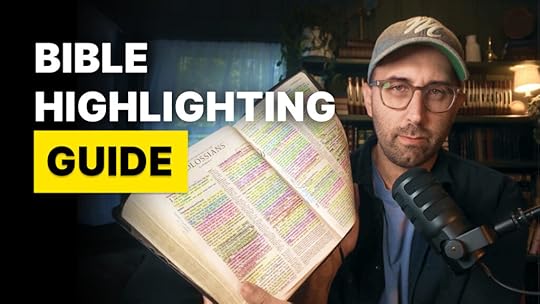
Hereâs a new video on my favorite method for highlighting the Bible. Instead of just marking themes, hierarchical highlighting uses different colors to show the structure of each paragraph. Itâs been a game-changer for my personal Bible study.
Weekly Wordââ¦our great God and Savior Jesus Christ, who gave himself for us to redeem us from all lawlessness and to purify for himself a people for his own possession who are zealous for good works.
â Titus 2:13bâ14
Our Lord didnât just free us from sin and death; He freed us for good works. Let a Christ-honoring passion for good works shape how you plan, prioritize, and persevere in whatever the Lord gives you to do today.
Worth Your TimeDon’t Retire; We Need You (4 mins)Over at Ligonier Alex Chediak encourages older saints to reinvest their golden years. âPerhaps your children are out of the home or youâre at a place financially where you can afford to work less. As one [of] a generation behind you, looking to your example and guidance, I entreat you: Give yourself structure so that hours arenât frittered away in passive consumption of television. Fight the cynicism that often accompanies the loss of physical or mental acuity. Make war with the temptation to spend time entirely in a familiar, comfortable circle of same-aged peers.âHow to Tell if Something is AI-Written (5 mins)
By now youâve probably learned to pick up on some of the âverbal ticksâ of AI-generated writing. But this article by Hollis Robbins goes beyond simple tips like look for em-dashes and helps you learn to sniff out AI content without relying on those cues that may change in future models, or needing to depend on an AI-checking software.Jordan Petersonâs Achilles Heel (5 mins)
A lot of Christians seem to appreciate Jordan Petersonâs life advice. But while Peterson talks about the Bible and Jesus a lot, he doesnât actually claim to be a Christian. Joel Pelsue explains whatâs going on and why we should be cautious of learning the Bible from someone like Peterson.Words of Wisdom
Take your Christian productivity to the next levelâInner silence is for our race a difficult achievement. There is a chattering part of the mind which continues, until it is corrected, to chatter on even in the holiest of places.â
â C.S. Lewis, Perelandra
Listen to the Podcast â The Redeeming Productivity Show is available on all podcast platforms and YouTube.â
Get the Book â Grab a copy of âRedeeming Productivity: Getting More Done for the Glory of Godâ
Join the Academy â Get access to all of our courses, workshops, private community, planner, and moreââ
Use the Planner â The all-in-one productivity system designed for Christians
September 4, 2025
Reagan’s Roundup: September 4th, 2025
Your weekly roundup of insights and resources to help you get more done for the glory of God.
In Todayâs Issue:Post-Summer Productivity ResetPruning Your CommitmentsWhy You Need BoredomProductivity Resources for Christian StudentsDealing with Ministry BurnoutDear steward,
Summerâs just about over, and life is speeding back upâschool, work, and routines all at once. If your habits have slipped, your goals feel fuzzy, or youâre overwhelmed, youâre not alone.
Join me on September 19th at 12 pm ET for a live webinar on how to get back on track to finish the year well.
In this free workshop, youâll learn how to:
Recover a God-glorifying mindset for your responsibilitiesReset your spiritual disciplinesGet clarity on your projects and goalsBy the end of our time together, you’ll have a simple, actionable plan to finish 2025 strong for the glory of God!
This event is completely free, but spots are limited. Register here.
Whatâs NewPrune Your Commitments to Finish the Year WellFeeling overcommitted? Learn how cutting back can help you finish the year strong and focused on what matters most.
Watch, read, or listen on Spotify or Apple Podcasts.
Weekly WordâEvery branch in me that does not bear fruit he takes away, and every branch that does bear fruit he prunes, that it may bear more fruit.â
â John 15:2
Is there anything less productive than a season of trials? But trials are often the kind discipline of the Vine Dresser, cutting us back to prepare us for even greater fruitfulness. Times of pruning are rarely fun, but we can endure them in faith knowing our Father is using them for our ultimate good.
Worth Your TimeYou Need to Be Bored. Hereâs Why. (6 mins) This video comes from an unbelieving worldview, but it’s still got some great reminders about the importance of boredom. Boredom is essential for our health and happiness. We need to take care that we arenât pushing it away. Bonus: Here are some of my thoughts on the Blessings of Boredom for Christian productivity. Student Productivity Resources : I just updated the student resources area on Redeeming Productivity. On there, you’ll find templates for organizing your classes, creating a weekly schedule that makes time for everything, recommended apps, articles, and resources on stewarding your studies for God’s glory, and more.How to Deal with Burnout in Ministry (4 mins) Ian Hamilton shares some wise advice for an increasingly common problem for pastors. I also deal with this topic in-depth in lesson 8 of Pastoral Productivity.Words of WisdomTake your Christian productivity to the next levelâMy attitude toward progress has passed from antagonism to boredom. I have long ceased to argue with people who prefer Thursday to Wednesday because it is Thursday.â
â G.K. Chesterton
Listen to the Podcast â The Redeeming Productivity Show is available on all podcast platforms and YouTube.â
Get the Book â Grab a copy of âRedeeming Productivity: Getting More Done for the Glory of Godâ
Join the Academy â Get access to all of our courses, workshops, private community, planner, and moreââ
Use the Planner â The all-in-one productivity system designed for Christians



